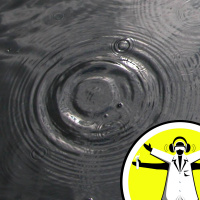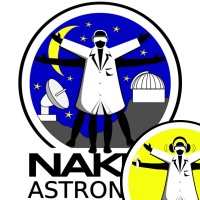Synopsis
The Naked Scientists flagship science show brings you a lighthearted look at the latest scientific breakthroughs, interviews with the world's top scientists, answers to your science questions and science experiments to try at home.
Episodes
-
The Science of Water Security
28/02/2010 Duration: 59minWe dive into the science of water security in this week's Naked Scientists. We find out how building a dam alters the local weather, and how simple interventions can help bring safe water and sanitation to the millions that still need it. We find out how new groups set up in Africa and Europe are bringing researchers together to help us use water more efficiently in an ever changing world, and discover the leak-stopping technology that really does hold water. Plus, the secret messages that fish send in ultra-violet and a genetic trick to stop Dengue getting off the ground. Like this podcast? Please help us by supporting the Naked Scientists
-
Winds, Wings, Whale Fins and Wind Power
21/02/2010 Duration: 01h02minHow can we make the most of the wind? In this week's Naked Scientists, we find out how Humpback whales have inspired a new, more efficient design for turbine blades and stall-resistant aeroplane wings and how an inflatable wind generator flies like a kite to extract energy from high altitude winds anywhere in the world. We also hear how a specially-designed wind generator has helped Antarctic-based scientists save 30 thousand litres of diesel. Plus, a simple programme to cut child deaths in the developing world by 30 percent, a new technique for keeping tabs on tumours and a sugar-based... Like this podcast? Please help us by supporting the Naked Scientists
-
Do animals use toilet paper?
14/02/2010 Duration: 59minWe investigate the toilet habits of the animal kingdom this week as well as taking a pot shot at which way a dirty golf ball swings in mid air, answering whether warmer waters attract more sharks and if there's a genetic basis to intelligence. We also get an update on what geologists studying the recent earthquake in Haiti are learning from information beamed back from space, and how a new tech-driven initiative called Crisis Camps is helping to streamline aid efforts after a catastrophe. Plus, laser-sensitive nanoparticles that can help to identify tumours, the genome of a 4000 year old man... Like this podcast? Please help us by supporting the Naked Scientists
-
Pollution & Plastics
07/02/2010 Duration: 59minCould plastics be polluting your body? This week, we hear how hormone-mimicking chemicals leaching from plastics can cause coronaries, strokes and diabetes. Even the plastic mineral water bottle isn't safe - snails grown in them produce more offspring. Also, how oestrogen in lakes can feminize fish and cause their populations to plummet, Meera takes a trip to the sewage works to see how we clean up our act and, in Kitchen Science, Ben and Dave play with mud to find out how a water filter works. Plus, the hot news this week: how sperm get turned on, recreating colourful dinosaurs and... Like this podcast? Please help us by supporting the Naked Scientists
-
Augmenting Reality
31/01/2010 Duration: 01h57sThe high-tech scanners that can home in on chemicals produced by cancers, how bats and dolphins share genes for echolocation and why barefoot runners have a smoother track record. Also this week, augment your reality: find out how new technologies can add extra information to the way you see the world by making a mobile phone into a virtual tour guide or even a pocket mechanic! Plus, how virtual reality worlds are helping to rehabilitate stroke victims, and, in a theatrical twist, for Kitchen Science Dave discovers the workings of a baffling stage illusion... Like this podcast? Please help us by supporting the Naked Scientists
-
Explosive Science!
24/01/2010 Duration: 01h15sOn this explosive Naked Scientists, explore the science of explosions, looking at what happens when a landmine explodes and how to study shockwaves. Plus, how to make safer 'insensitive' munitions, and the 'ecology' of insurgency. Plus, how infected cells accelerate the infection rate, why your memories are stored in a grid and in Kitchen Science we show you how to do a controlled explosion in your own home! Like this podcast? Please help us by supporting the Naked Scientists
-
Does Farting make you Weigh Less?
17/01/2010 Duration: 01h06minCan sea water keep roads frost-free? Why does the LHC need to be so cold? How does antifreeze work and what's the freezing point of beer? This week we run the risk of frostbite to tackle the coolest science questions as well as warming up in the hot tub to hear what household appliances devour the most power! We also find out how researchers are growing stem cells from umbilical cord blood, the scientific reason why a needle is so hard to find in a haystack, and how the smell of a fertile woman boosts a man's testosterone. Plus, do people really look like their pets? Like this podcast? Please help us by supporting the Naked Scientists
-
Listen Here! The Science of Sound and Hearing
10/01/2010 Duration: 59minWe open our ears to the science of sound and hearing this week with a look at the genetic causes of deafness and how a deaf person's brain decodes sign language. We also hear how auditory illusions can fool you into hearing things that aren't there and meet a sound simulation system that can improve the clarity of railway station announcements and recreate the "cocktail party effect" to help build better hearing aids. Plus, we find out why light makes migraines more painful, how cleaner fish keep each other in check and, in Kitchen Science, Dave swaps Ben's ears around... Like this podcast? Please help us by supporting the Naked Scientists
-
Launching Naked Astronomy
05/01/2010 Duration: 52minThrusting space science into the audio dimension, this week the Naked Scientists unveil a new series for 2010 - Naked Astronomy. Hosted by Ben Valsler together with Cambridge space scientists Carolin Crawford, Andrew Pontzen, Dominic Ford and a host of other cosmologically-gifted contributors, this new monthly programme brings the Universe to your ears. Further episodes of the show are available at nakedscientists.com/astronomy Like this podcast? Please help us by supporting the Naked Scientists
-
Dissecting Christmas Dinner
20/12/2009 Duration: 55minIn a festive mood, this week the Naked Scientists meet their meat and dissect Christmas Dinner, but not with a carving knife! We also hear how scientists are able to re-create the acoustics of long-gone churches and cathedrals to appreciate how ancient musical compositions and carols would have sounded to an assembled congregation. Plus we also come face to face with a submarine volcano, dip into the story of a planet formed exclusively from water and find out why the skull is impervious to the effects of osteoporosis... Like this podcast? Please help us by supporting the Naked Scientists
-
Was Swine 'Flu Man-Made?
13/12/2009 Duration: 56minWhere did the 2009 H1N1 swine influenza pandemic come from? This week we hear the evidence that this new 'flu may have escaped from a laboratory. We also explore rising rates of resistance to the antiviral drug Tamiflu, hear how 'flu vaccines are made and a mutant 'flu strain developed by scientists to protect the population. Plus, why soy cuts cancer recurrence rates, how a case of mistaken identity spells trouble for endangered fish, a computer model for unclogging coronary arteries and in Kitchen Science Ben and Dave measure the speed of a sneeze... Like this podcast? Please help us by supporting the Naked Scientists
-
Understanding Hepatitis C
06/12/2009 Duration: 01h15sJoin us to explore the virus behind Hepatitis C. We'lle be investigating the causes, prevention and treatment of this often masked but serious disease. Like this podcast? Please help us by supporting the Naked Scientists
-
What if a Meteorite Destroyed the Moon?
29/11/2009 Duration: 01h06minHow wide is the universe? What makes steak tough? Why does beetroot give me red urine? These tricky questions get stripped down in this Naked Scientists Question and Answer show. We'll be hearing about the camouflaged plant that doesn't need the Sun, a power plant that relies on osmosis and how the feeling of breath on your skin helps you to work out what sounds you're hearing. Also, in Kitchen Science, we use straws and a cup of water to show you how airbrushes and carburettors work! Like this podcast? Please help us by supporting the Naked Scientists
-
Science Down Under
22/11/2009 Duration: 01h14sThis week, we head down under to explore the latest Australasian science - we'll discover the new, state-of-the-art facility where high-tech lasers and cameras breed the best plants; explore a new remedy for wine ruined by bush fires and find out why grapes killing themselves is the tip to a wonderful tipple. We also reveal, two new bowel-bugs that cause gastroenteritis and why porridge is good for your guts. Plus, we investigate the best temperatures for serving wine, in Question of the Week! Like this podcast? Please help us by supporting the Naked Scientists
-
Producing Planets
15/11/2009 Duration: 57minOn this week's Naked Scientists, we seek the start of the solar system. We'll be finding out how clouds of gas and dust can clump and diversify to become stars, asteroids and the planets we know so well. Plus, we find out what happens to sculpt the surface of planets, and how the Rosetta mission will be the first craft to land on a comet! Also,how the smell of old books can help to preserve them, deleting old memories to make room for new ones and the frightening rate of Greenland ice loss. Plus, in Kitchen Science, Ben and Dave explain how margarine and meteorites tell us about Earth's... Like this podcast? Please help us by supporting the Naked Scientists
-
Investigating Infertility
08/11/2009 Duration: 01h04minThis week, we investigate infertility and In-Vitro Fertilization (IVF). We find out how a new high resolution temperature monitor conceived in Cambridge can help couples get pregnant, and explore new ways to improve the success of fertility treatment. Plus, a new extra-fast and super-cheap way to sequence the human genome, the science of eating slowly, and fish dining out at the Shark Cafe. Also, we find out how newborns cry with an accent and examine the inner workings of an egg... Like this podcast? Please help us by supporting the Naked Scientists
-
Where do lost socks go?
01/11/2009 Duration: 01h05minThe most distant object ever discovered as well as the events of National Pathology week feature in this week's show as we take on your science questions! We investigate whysocks go missing in the wash, whether light from the sun is a continuous beam and whether numerous vaccines can be given together in one dose. We also find out how higher heels make for a better runner and reveal the world's fastest camera. Plus, we find out why we get a better signal when holding an aerial and show you how to make a helicopter using card and pencils! Like this podcast? Please help us by supporting the Naked Scientists
-
Introducing - The Diamond Light Source Podcast
29/10/2009 Duration: 26minThis week we're showcasing a new bimonthly programme strand which we're making in collaboration with the folks at Diamond, the UK's Synchrotron Light Source. In this episode, we dig deep into the world of archaeology to learn how scientists at Diamond are investigating our cultural heritage. We find out how scanning samples of the Dead Sea Scrolls can help decipher them, how probing timber from the Mary Rose can improve its conservation and how studying pigments in paintings could protect major pieces of art! Find out more at www.thenakedscientists.com/diamond. Like this podcast? Please help us by supporting the Naked Scientists
-
The Diseased Brain
24/10/2009 Duration: 01h50sWe explore the basis of brain diseases on this week's Naked Scientists. We find out what happens to the brain in Huntington's disease, discover the genes behind Alzheimers and a potential treatment for autoimmune diseases like Multiple Sclerosis or MS. Also, the nerve cells in the ear that make loud sounds painful, the extraordinary eyes of the Mantis Shrimp and the world's largest web spinning spider. Plus, how spiders make glue from silk and snot, and in Kitchen Science, we show you a way to fool your brain into making your body do something unexpected. Like this podcast? Please help us by supporting the Naked Scientists
-
High Altitude Adventures
17/10/2009 Duration: 58minWe reach for the skies on this week's Naked Scientists, with High Altitude Adventures. We find out how the body reacts to the low oxygen at high altitudes, and join Laura Soul testing the theories on a trek up to Everest base camp. Plus, we find out how the continental collisions that made mountains may have plunged the Earth into an ice age. We also hear how the rate of mutation changes in lab-bench evolution, how looming sounds make our vision more sensitive, why poking a stem cell can change its fate and the chemistry behind the taste of fizz. In Kitchen Science, we make a mountain... Like this podcast? Please help us by supporting the Naked Scientists

































